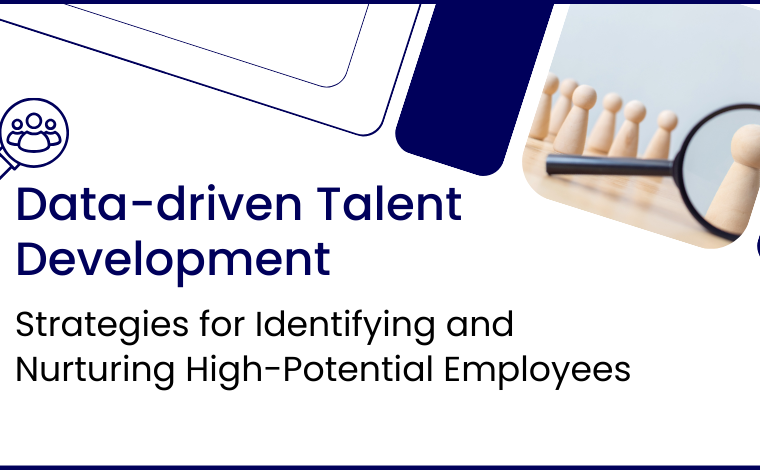The Future of Learning and Development: Embracing Data-driven Strategies for Success

Stay Informed With Our Weekly Newsletter
Receive crucial updates on the ever-evolving landscape of technology and innovation.
The world of education and corporate training is rapidly evolving. Traditional approaches have given way to innovative, data-driven strategies that enhance learning and development.
The increasing accessibility of technology and the proliferation of data have marked a profound shift in how learning strategies are formulated and implemented.
Understanding the importance of data in learning and development

In the era of information, data is a powerful tool that influences decision-making processes in various sectors, including education and corporate training. Harnessing data can unveil invaluable insights, empowering individuals and organisations to adapt and evolve.
Analysing performance metrics, engagement rates, and feedback can highlight learning gaps, measure the effectiveness of educational interventions, and inform strategic decisions to enhance learning outcomes.
The role of data in modern education
Data is pivotal in shaping modern education. It enables evidence-based decision-making, providing a more objective approach to educational improvement.
With learning analytics, institutions can optimise teaching methods, align curricula with student needs, and personalise learning to improve student engagement and performance.
Moreover, data allows for real-time feedback, helping educators and learners understand learning progress and enabling immediate interventions whenever necessary. Data empowers educators to provide more effective, tailored instruction based on empirical evidence.
For example, by analysing data on student performance, educators can identify specific areas where students may be struggling and provide targeted interventions to address those challenges.
This personalised approach to instruction can significantly improve learning outcomes and ensure that each student receives the support they need to succeed.
Data can also identify trends and patterns in student behaviour, such as their preferred learning styles or times when they are most engaged. Armed with this information, educators can adapt their teaching strategies better to meet the needs and preferences of their students, ultimately creating a more engaging and effective learning environment.
How data influences corporate training and development
Similarly, in the corporate sector, data-driven strategies lead to more effective learning and development approaches.
Data can unveil patterns in employee performance, identify knowledge gaps, and inform the design of tailored training programmes. This not only improves the individual employee’s capabilities but also contributes to the overall growth and success of the organisation.
In addition, data can track the effectiveness of training programs by measuring employee engagement, knowledge retention, and on-the-job application of newly acquired skills.
This information allows companies to make data-driven decisions about allocating resources and developing future training initiatives. In this way, data-driven strategies greatly enhance employee development, productivity, and overall organisational performance.
Moreover, data can help identify high-performing employees and recognise their achievements, providing valuable insights for talent management and succession planning.
Data plays a crucial role in education and corporate training by providing valuable insights, enabling evidence-based decision-making, and driving continuous improvement. As technology advances, the importance of data in learning and development will continue to grow, revolutionising how we educate and train individuals for success.
The shift towards data-driven strategies

Technology uptake in learning and development has facilitated the shift towards data-driven strategies. As data collection and analysis techniques have advanced, so too influences data in these realms.
In today’s digital age, data has become valuable in various industries, including education and corporate training. With the exponential growth of online learning platforms and the increasing availability of data, educators and organisations are harnessing the power of data to drive their strategies.
From predictive analytics to machine learning, cutting-edge tools and technologies enable a more sophisticated data application in learning and development. Online learning platforms, for example, mine extensive data to tailor learning pathways, making education more personalised and effective.
By analysing data on individual learners, these platforms can identify their strengths and weaknesses, allowing instructors to provide targeted support and guidance. This data-driven approach enhances the learning experience and improves learner outcomes.
The evolution of data-driven learning
Data-driven learning strategies have come a long way over the years. Initially, data collection and analysis were limited to basic demographic information and performance metrics.
However, with technological advancements, the scope of data-driven learning has expanded significantly.
Today, data-driven learning encompasses many variables, including learner engagement, cognitive abilities, and emotional states. Educators can use sophisticated algorithms and artificial intelligence to gain deeper insights into the learning process and tailor instruction accordingly.
For instance, data analysis can reveal patterns in learner behaviour, such as preferred learning styles or time of day when they are most receptive to new information. With this knowledge, educators can design learning experiences that align with individual preferences, resulting in higher engagement and knowledge retention.
Furthermore, data-driven learning strategies are more comprehensive than traditional educational settings. They can also be applied in corporate training programs, where organisations leverage data to enhance employee performance and productivity.
Case studies of successful data-driven learning strategies
Various institutions and corporates worldwide are already reaping the benefits of data-driven learning strategies. Case studies from diverse sectors illustrate successful implementations and underscore the potential of such methods.
For instance, some universities have leveraged data analytics to identify and support at-risk students, improving retention rates. By analysing various data points, such as attendance records, assignment scores, and engagement levels, educators can pinpoint students who may be struggling and provide timely interventions.
Similarly, several top-rated companies have made astute use of data to design customised training programs, resulting in increased workplace efficiency and productivity. By analysing employee performance data and identifying skill gaps, organisations can develop targeted training initiatives that address specific needs and improve workforce capabilities.
Moreover, data-driven learning strategies have also proven effective in adapting to the ever-changing needs of learners. Educators can identify emerging trends and adjust their instructional approaches by continuously monitoring and analysing learner data.
The shift towards data-driven strategies in learning and development is transforming the educational landscape. With the power of data, educators and organisations can personalise learning experiences, improve learner outcomes, and drive success in the digital age.
Implementing data-driven strategies in learning and development

Adopting a data-driven approach to learning and development may seem daunting, but with careful planning and execution, significant progress can be achieved.
Steps to incorporate data in your learning strategy
Successful implementation of data-driven strategies requires clear goals, reliable data collection methods, robust analysis techniques, and a commitment to continuous improvement. Tools such as learning management systems or data analytics software can facilitate this process.
Moreover, integrating data into learning strategies demands technical expertise and a cultural shift towards data literacy. Educators, trainers, and learners should be equipped with skills to understand, interpret, and use data purposefully.
Overcoming challenges in implementing data-driven strategies
While the benefits of data-driven learning are substantial, challenges may occur. These encompass data privacy issues, the complexity of data analysis, resistance to change, and the need for consistent stakeholder engagement.
Overcoming these challenges requires a comprehensive strategy focused on secure data handling, capacity building, early and continuous communication, and proactive stakeholder involvement.
The future of data-driven learning and development

The momentum towards data-driven learning and development is unlikely to abate. If anything, it will intensify with advancements in technology and a growing appreciation for the transformative potential of data.
Predicted trends in data-driven learning
The future will see the rise of advanced analytics, further personalisation of learning, greater use of predictive modelling, and broader implications for policy and practice. Institutional and organisational culture will increasingly embrace data, fostering a continuously improving learning ecosystem.
The long-term impact of data on learning and development
As data becomes more integral in defining strategies, its long-term impact on learning and development will be profound. Enhanced learning outcomes, improved retention rates, and increased workplace productivity are just the tip of the iceberg.
Beyond that, data-driven strategies enable a more equitable, inclusive, and efficient education and training landscape, setting the stage for the learning and development domain’s sustainable future.
Conclusion
Would you like to take your business to new heights with data-driven strategies? The Institute of Data offers corporate training services that provide a variety of training programs to help your business. Our services will assist you in harnessing the power of data to achieve your business goals.


